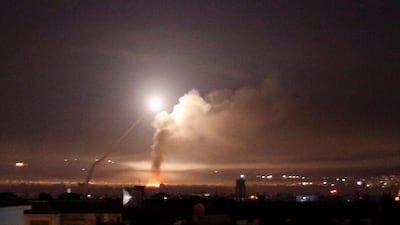Foreign ministers from the top three European powers face a tough challenge when Mohammad Javid Zarif, their Iranian counterpart, arrives early next week for discussions on shoring up the 2015 nuclear deal folllowing America’s withdrawal.
It is how to balance the need to maintain Iranian faith in the deal while also reflecting dismay at the overnight outbreak of direct clashes between Iranian forces and Israel in Syria.
Officials and analysts in London concede there is no easy path open to the Europeans as governments reinforce the deal, known by its acronym JCPOA.
Boris Johnson, the British foreign secretary, is one of the ministers who will meet with Zarif. In a statement on Thursday, he condemned Iranian aggression at the flashpoint Syrian border.
“The United Kingdom condemns in the strongest terms the Iranian rocket attacks against Israeli forces. We strongly support Israel’s right to defend itself,” he said. “We urge Iran to refrain from further actions which will only lead to increased instability in the region. It is crucial to avoid any further escalations, which would be in no one’s interest.
“We also continue to call on Russia to use its influence to press those in Syria to cease their destabilising activity and work towards a broader political settlement.”
______________
Iran nuclear deal
Europe must no longer rely on US for protection: Merkel
US wary of Iran-Israel confrontation risk and seeks 'collective response'
Iran and Israel escalation 'matter of war and peace'
______________
Yet there is no telling if that language will be reflected at the table when Mr Johnson sits down with Mr Zarif plus Jean-Yves Le Drian of France, Heiko Maas of Germany and Federica Mogherini, representing the EU.
British officials believe the urgent focus of the talks must be on the nuclear agreement. Getting Iran to agree to suspend uranium enrichment and other aspects of their work towards a nuclear bomb was the product of 13 years of diplomacy. The Europeans are loathe to follow President Trump’s lead.
To hold on to Iran, the officials will offer measures to continue business contacts with Tehran, either by getting waivers from the US administration to exempt the oil trade -- and banking -- or ring-fencing their commercial firms from the reach of the US penalties. One British official said the work behind the scenes was dominated by thinking on how to keep the partnership going.
A senior Iranian foreign policy expert Mahmood Sariolghalam, Professor of International Relations, Shahid Beheshti University, the National University of Iran, told a briefing in London that the US decision brought into a long-standing goal of Iranian foreign policy into play. Dividing European policy makers from their US counterparts had long stood as a cherished goal.
From a Tehran perspective by doing so, Iran could concentrate on its top foreign policy priority the containment of the US and Israel in the middle east. Thus the US decision perpetuates the influence and prejudices of the “generotocracy” at the top in Iran that sets the country’s agenda beyond its borders, he said.
Read more: Scramble to shore up Iran nuclear deal as tensions rise
“Trump has handed a unique opportunity to hardline political elites to build on Iranian frustration. Not only can the hardliners use the breakdown of the deal to establish unity among the divided elites, but they can also build bridges with the Iranian population after protests in January,” said Chatham House analyst Sanam Vakil, a specialist on the middle east. “In the weeks ahead, Tehran will seek to pressure the EU in particular to defend the deal. If that defence does not materialise though, Iran will gradually restart its nuclear programme. The wider consequence here is that other regional actors such as Saudi Arabia will also make similar moves accelerating the issue of regional nuclear proliferation.”
Previous rifts between the US and Europe, such as the divide over sanctions on Cuba, had relatively limited repercussions. Many experts doubt that the Europeans can take the right steps to save the deal in the long run and fear that failure will have global consequences. “If the US withdrawal from the JCPOA also carries consequences beyond the implementation of sanctions commitments, it also adds to the growing rift between Brussels and Washington on sanctions policy,” wrote Emil Dall, a research fellow at the Royal United Services Institute. “US sanctions against Iran were successful in bringing Tehran to the negotiating table because they had support from European allies.
"A coordinated sanctions agenda between the US and Europe will generate additional pressure against target states. However, when such alignment is lacking, it will be difficult to achieve this policy aim.”


